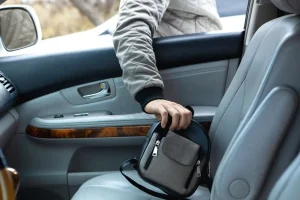If you’re not diligent about cleaning out your car, you might end up with any number of possessions living in your floorboards, hiding out in your back seat, and potentially luring criminals to break into your car.
If you’re quickly running into the store and don’t want to carry your bag with you, or you go inside for the night without realizing you’ve left something valuable in the passenger seat, you might come back out to your car and discover there’s been a break-in. You might also be surprised to learn it’s not your auto insurance that will come through in this pinch, either.
If your car’s been broken into, it may be time to file a homeowners insurance theft claim. Here’s what you need to know.
Does Homeowners Insurance Cover Theft From a Car?
Your homeowners or renters insurance policy covers theft of your personal possessions, even if they’re stored in your car at the time that they’re stolen.
If someone breaks into your car, your first act should also be to call the police. Having a formal police report might help you recover your stolen items, but it will also be helpful in filing a homeowners insurance theft claim.
Your homeowners insurance provider may require you to have a police report of the robbery before proceeding with a theft claim, so make sure you have all the paperwork in order before reaching out to your insurance representative.
Will Homeowners Insurance Cover Stolen Tools From a Car?
If you have tools or other home improvement items stolen from a car, the personal property protection coverage in your homeowners insurance policy can help pay to have them replaced. However, if those tools are part of your business, you may need commercial property insurance to protect them.
Items that are typically stored in your home, including the tools housed in your garage or shed, are protected from vehicle theft through your homeowners insurance company. If you have those items stored in your car for a period of time and someone breaks in, you may want to file a homeowners insurance theft claim.
If the tools or equipment are permanently housed somewhere that isn’t your home, your homeowners insurance may deny the theft claim. As an example, if you run a landscape business and keep expensive tools stored in your vehicle at all times or an external storage site, your homeowners insurance may not cover the cost of replacing them after a break-in.
Some overly expensive items (including art or jewelry) may not be covered by your homeowners insurance without additional policies in place, and so they may not be covered by theft from your vehicle.
Does Homeowners Insurance Cover a Stolen Car?
While your homeowners insurance will cover theft from your car, homeowners insurance policies do not include coverage for a vehicle that is stolen, regardless of where it was parked beforehand.
If someone breaks into your car and steals your cell phone or your computer bag, you would file a homeowners insurance theft claim to begin the process of replacing those items. On the other hand, if your car is stolen, only your car insurance company can help you begin to replace the missing vehicle.
Not unlike a smaller theft claim, the first step to reporting a stolen vehicle is to call the police and file a formal report identifying your vehicle as lost or stolen. Your insurance company will require a police report detailing the theft before they will begin to process a claim.
You will also need comprehensive coverage to file a claim against your car insurance policy for a stolen vehicle. If your auto insurance coverage only includes liability, your coverage won’t include the cost of replacing a stolen vehicle.
The editorial content on Clovered’s website is meant to be informational material and should not be considered legal advice.

